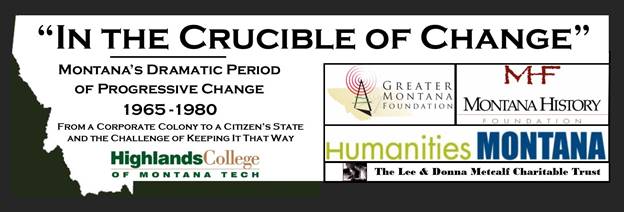
Document Type
Transcript
Publication Date
Fall 2015
Abstract
The dramatic period of progressive change in Montana that is documented "In the Crucible of Change" series really exploded with the election of Governors Forrest Anderson and Tom Judge. Anderson's single term saw the dispatching of the sales tax as an issue for a long period, the reorganization of the executive branch of state government and the revision of Montana's Constitution. As a former legislator, county attorney, Supreme Court justice, and Attorney General, Anderson brought unmatched experience to the governorship when elected. Tom Judge, although much younger (elected MT’s youngest governor at age 38 immediately following Anderson), also brought serious experience to the governorship: six years as a MT State Representative, two years as a MT State Senator, four years is Lieutenant Governor and significant business experience. The campaign and election of John F. Kennedy in 1960 spurred other young Americans to service, including Tom Judge. First elected in 1960, he rose rapidly through MT’s political-governmental hierarchy until he took over the governorship in time to implement many of the changes started in Governor Anderson’s term. But as a strong progressive leader in his own right, Governor Judge sponsored and implemented significant advancements of his own for Montana. Those accomplishments, however, are the subject of other films in this series. This film deals with Tom Judge’s early years – his rise to the governorship from when he returned home after college at Notre Dame and newspaper experience in Kentucky to his actual election in November 1972.
That story is discussed in this episode by three major players in the effort, all directly involved in Tom Judge’s early years and path to the governorship: Sidney Armstrong, Larry Pettit and Kent Kleinkopf. Their recollections of the early Tom Judge and the period of his advancement to the governorship provide an insider’s perspective of the growth of this significant leader of the important period of progressive change documented “In the Crucible of Change.”
Sidney Armstrong, President of Sidney Armstrong Consulting, serves on the board and as the Executive Director of the Greater Montana Foundation. Formerly Executive Director of the Montana Community Foundation (MCF), she has served on national committees and participated in national foundation initiatives. While at MCF, she worked extensively with MT Governors Racicot and Martz on the state charitable endowment tax credit and other endowed philanthropy issues. A member of MT Governor Thomas L. Judge’s staff in the 1970s, she was also part of Governor Brian Schweitzer’s 2004 Transition Team, continuing to serve as a volunteer advisor during his term. In the 1980s, Sidney also worked for the MT State AFL-CIO and the MT Democratic Party as well as working two sessions with the MT Senate as Assistant Secretary of the Senate and aide to the President. A Helena native, and great granddaughter of pioneer Montanans, Sidney has served on numerous nonprofit boards, and is currently a board member for the Montana History Foundation. Recently she served on the board of the Holter Museum of Art and was a Governor’s appointee to the Humanities Montana board. She is a graduate of the International School of Geneva, Switzerland and the University of Montana. Armstrong's Irish maternal immigrant great-grandparents, Thomas and Maria Cahill Cooney, came to Virginia City, MT in a covered wagon in 1865, looking for gold. Eventually, they settled on the banks of the Missouri River outside Helena as ranchers. She also has roots in Butte, MT, where her journalist father's family, both of whom were newspaper people, lived. Her father, Richard K. O’Malley, is also the author of a well-known book about Butte, Mile High, Mile Deep, recently re-published by Russell Chatham. She is the mother of four and the grandmother of eight.
Recommended Citation
Armstrong, Sidney; Kleinkopf, Kent; Pettit, Lawrence K. Ph.D.; and Barrett, Evan, "Transcript for Episode 11: Destined to Lead: Tom Judge's Path to Becoming Montana's 18th & Youngest Governor - In the Crucible of Change" (2015). Crucible Episode Transcripts (old). Paper 15.
http://digitalcommons.mtech.edu/crucible_transcripts/15
